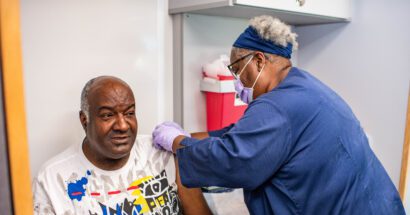Sentara’s support helps build the necessary skills to navigate health, financial, and career development journeys.
Literacy is more than the ability to read and comprehend words on a page. It’s helping a child finish their homework. It’s understanding the potential interactions listed on a bottle of medicine. It’s conducting a job search with confidence.
One of Sentara’s long-standing partners, Literacy for Life, takes this expanded definition to heart, working with adults in Williamsburg, Virginia who often come to the organization without a high school diploma, reading below a fourth-grade level, or lacking proficiency in English.
“Each of these individuals carry their own unique life experiences and their own specific goals,” says Jason Thornton, Literacy for Life’s executive director, “and yet all navigate a world that requires multiple literacies to thrive.”
“People need digital literacy skills, financial literacy, health literacy, and employment literacy,” Thornton says. “That’s why we take a holistic approach that also centers what they want to accomplish so they can reach those goals and stay engaged.”
Through programs like Health Education and Literacy (HEAL), On the Money, and EmployEd, Literacy for Life offers complementary instruction and support services to help individuals navigate their health, financial, and career development journeys. With the help of funding from Sentara, Literacy for Life’s newest program, TechConnect, aims to reduce the digital equity gap by teaching digital literacy and helping learners access affordable broadband and free devices.
In 2023, the organization served 700 learners, and if trends hold, Thornton says many will stay on as volunteers to share their experiences and pass on the skills they’ve learned. In fact, every year, Literacy for Life provides opportunities for more than 200 community volunteers to work directly with learners while continuing to build their own life and career skills in the process.
Did you know?
In the U.S., nearly 54% of adults ages 16 to 74 read below a sixth-grade level. Low literacy levels put these individuals at a significant disadvantage in the job market, leading to reduced earnings and having a negative impact on health outcomes.
- Individuals with inadequate health literacy are three times more likely to revisit the emergency department within 90 days of discharge.
- Adults with low literacy are over 10 times more likely to rely on public financial assistance and earn an average of only $300 per week, even when working full-time.
- Patients with low health literacy experience more frequent and prolonged hospital admissions and higher mortality rates.


